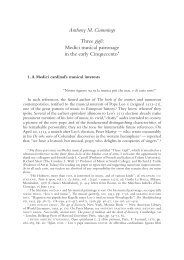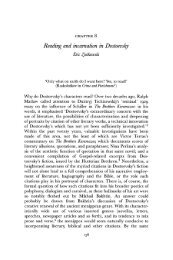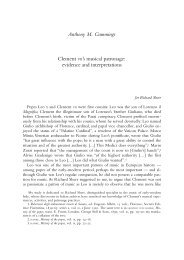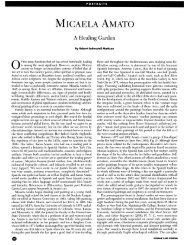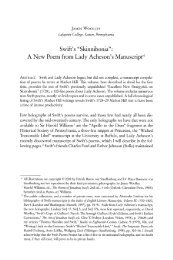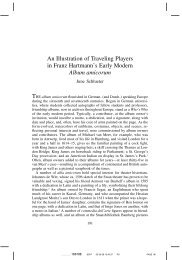courses of instruction - Lafayette College
courses of instruction - Lafayette College
courses of instruction - Lafayette College
You also want an ePaper? Increase the reach of your titles
YUMPU automatically turns print PDFs into web optimized ePapers that Google loves.
BIOCHEMISTRY<br />
For this interdisciplinary major, students<br />
take <strong>courses</strong> in biology, chemistry, and psy<br />
chology. From a set <strong>of</strong> core <strong>courses</strong> in be<br />
havioral neuroscience, students examine<br />
the nervous system at different levels and<br />
explore how human and animal behavior<br />
are affected by its actions. Students can<br />
study the neural and behavioral activities<br />
<strong>of</strong> animals and humans using such equip<br />
ment as electroencephalographs (EEC) and<br />
high-performance liquid chromatography.<br />
Hands-on learning opportunities are<br />
emphasized through laboratory <strong>courses</strong><br />
and student-directed research experiences.<br />
These have led to student presentations at<br />
pr<strong>of</strong>essional conferences and coauthored<br />
journal articles. Internships are available to<br />
explore the applied aspects <strong>of</strong> behavioral<br />
neuroscience with placements ranging from<br />
a local game preserve to a health facility<br />
specializing in Alzheimer's disease.<br />
Students have the opportunity to do<br />
one-on-one research with a faculty member<br />
through the EXCEL Scholars program, and<br />
those who qualify may conduct two semes<br />
ters <strong>of</strong> research leading to an honors thesis.<br />
Requirements for the B.S. major in Behav<br />
ioral Neuroscience: 16 <strong>courses</strong> in addition<br />
to the Common Course <strong>of</strong> Study. Required<br />
<strong>courses</strong> include: Biology 101,102,256;<br />
Chemistry 121,122,221; Psychology 110,<br />
120,203,225 or 322,323, and 423; choose<br />
two electives from the following group:<br />
Psychology 232,233,240,321,324,325,225,<br />
and 322 (both <strong>of</strong> these <strong>courses</strong> can only be<br />
used as an elective if not taken as a required<br />
course), Computer Science 302; and two<br />
electives from the following group: Biology<br />
211,212, 241,251,261, or Chemistry 351.<br />
BIOCHEMISTRY<br />
Majors in Biochemistry, one <strong>of</strong> the fastest<br />
growing fields <strong>of</strong> science, take a core <strong>of</strong><br />
chemistry and biology <strong>courses</strong> including<br />
molecular biology, genetics, and physio<br />
logy. The curriculum involves the study <strong>of</strong><br />
the chemical characteristics and reactions<br />
<strong>of</strong> organisms or living systems.<br />
All <strong>of</strong> the chemistry and biology faculty<br />
carry on active research programs in<br />
which students are encouraged to partici<br />
66<br />
pate. Biochemistry majors <strong>of</strong>ten create<br />
projects in which they are guided by both<br />
a biology and a chemistry pr<strong>of</strong>essor.<br />
Students can perform research as inde<br />
pendent study or through the honors<br />
program. Based on their academic record<br />
and an interview, upperclass students may<br />
apply to be teaching assistants.<br />
Requirements for the A.B. degree in Bio<br />
chemistry: Mathematics 125/186 or<br />
161/162 or 161/176; Physics 111/112 or<br />
121/122; Chemistry 121/122 or 125/213,<br />
221, 222, 231, 311 (or: (323 or 325) and (324<br />
or 326)), 351,352,452, and at least one oth<br />
er advanced (200-level or above excluding<br />
independent study or thesis) Chemistry<br />
course (or none if Chemistry (323 or 325)<br />
and (324 or 326) are taken); Biology 101,<br />
102, 261, and at least one other advanced<br />
Biology (200-level or above) course in ad<br />
dition to other <strong>College</strong>-wide requirements<br />
for the A.B. degree.<br />
Requirements for the B.S. degree in Bio<br />
chemistry: Mathematics 161,162, and 263;<br />
Physics 121/122; Chemistry 121/122 or<br />
125/213,221, 222,231, 323 or 325, 324 or<br />
326 (must complete one <strong>of</strong> either 325 or<br />
326), 332, 391 or 495, 351, 352,452, and at<br />
least one other advanced chemistry course<br />
(200 or higher level, excluding indepen<br />
dent study or thesis). Biology 101,102,<br />
261, and one additional Biology course<br />
(200 level or higher), and one additional<br />
300- or 400-level course in either Chemis<br />
try or Biology in addition to other <strong>College</strong>-<br />
wide requirements for the B.S. degree.<br />
BIOLOGY<br />
Pr<strong>of</strong>essor Majumdar, Head; Pr<strong>of</strong>essors Fried,<br />
Holliday; Associate Pr<strong>of</strong>essors Leibel, Waters;<br />
Assistant Pr<strong>of</strong>essors Reynolds, Young, Caslake;<br />
General Biology Laboratory Coordinator/<br />
Lecturer Mineo; Laboratory Supervisor<br />
Schoeneck<br />
Biology, the study <strong>of</strong> life, challenges stu<br />
dents to think creatively and analytically<br />
and allows them to participate in a fasci<br />
nating academic adventure. The many ex<br />
citing discoveries in medicine, genetics,




